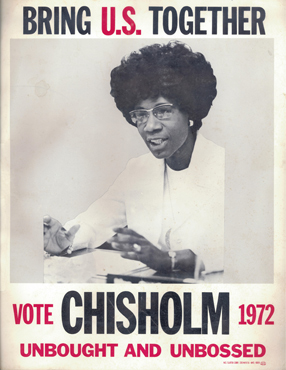This is part of The Shadow League’s Women’s History Month In Focus series celebrating excellence in sports, entertainment and culture.
Shirley Chisholm: proud, intelligent, defiant and ahead of her time. She was born November 30, 1924 in New York City and died January 1, 2005. Indeed, eventually our mortal shells will fail. But what we do in between the lines is what legacies are made of. Her distinct West Indian accent was stern and forthright when confronting her political adversaries, but Chisholm was also known to be very funny, supportive and was as adept at the game of politics as any of her colleagues, who were all male at the time.
Chisolm was an accomplished student at Girls’ High School in Brooklyn, and would go onto earn a BA from Brooklyn College. She won multiple debate contests while there. She would marry Conrad O. Chisolm in the late 40s and would keep the name after their divorce in 1977.
She taught nursery school to make ends meet while working towards her MA in elementary education at Columbia University. She would be named director of the Friends Day Nursery in Brownsville and the Hamilton-Madison Child Care Center in lower Manhattan. Chisolm would later say it was during her time at the nursery schools that she was first struck with the idea to get into politics.
During her three-year stint as a member of the New York State Assembly from 1965 to 1968, sitting in the 175th, 176th and 177th New York State Legislatures, Chisolm helped pass legislation for getting unemployment benefits extended to domestic workers, championed and sponsored the introduction of a SEEK program (Search for Education, Elevation and Knowledge), which called for individuals from disadvantaged backgrounds to have access to remedial courses in college, to the state.

Though New York was her home state, her aspirations could not be contained by the State Legislature. In August of 1968, she was elected as the Democratic National Committeewoman from New York State. Her campaign slogan; “Unbought and unbossed”. In winning the democratic primary, which itself was the result of a court-mandated reapportionment plan, she defeated two other black opponents; State senator Williams S. Thompson and labor official Dollie Robertson. She would face former Congress of Racial Equality director James L. Farmer Jr and would trounce the Republican candidate by a count of two-to-one.
She made history by becoming the first Black Congresswoman, but her legacy as a champion for the poor would march on. She was assigned to the House Agricultural Committee and initially did not see how she could help the people in her district serving there. However, it was from there that she expanded the food stamp program and helped create the Special Supplemental Nutrition Program for Women, Infants and Children (WIC). She also served on the Veterans’ Affairs, Education and Labor Committees, the latter of which was her preferred assignment.

Chisolm was a founding member of the Congressional Black Caucus, and in the same year was a founding member of the National Women’s Political Caucus as well. would make history again on January 25, 1972 where she called for a “bloodless revolution” at the Democratic Convention. She was the first black major-party candidate to run for President of the United States, and the first woman to ever run for the Democratic nomination.
She faced a great deal of apathy from the Democratic establishment during her run for the White House, and from her black male Congressional colleagues specifically. She won New Jersey, Louisiana and Mississippi during the primary via a deal with former vice president Hubert Humphrey, who released his black delegates to Chisolm as a symbolic protest against the nomination of Senator George McGovern. Despite that, Chisolm would finish in seventh place.
However, her legacy is one of service to the people and being firm against bullies. She was never bought nor bossed. She is a shining example of tenacity and persistence, regardless of race or gender.
She resigned from Congress in 1982 after witnessing Ronald Reagan demolish many of the programs she held dear, later saying that the disappointment was too great.
She returned to the essence at 80 years old. In a current political age which Democrats and liberals have to compromise and bow to the whims of hard-charging conservatives, Shirley Chisolm is a shining example of what seems to be relatively nonexistent these days, a Progressive Democrat with a backbone.



